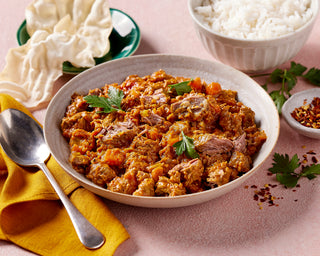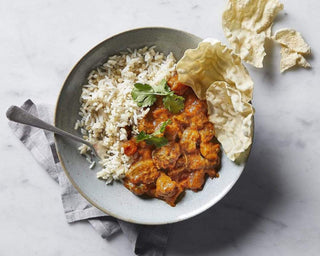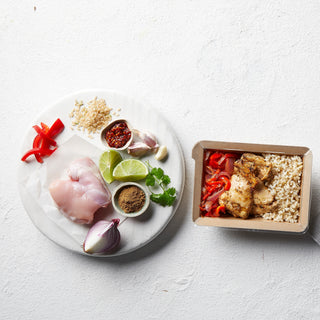
Whether you’ve noticed or not, calories or kilojoules (if we are being technically correct) are a topic we - in the past - have veered away from. And not because we’re scared of them or hiding anything, but because we have a strong desire for people to have a healthy, balanced lifestyle with good nutrition and not to have people encapsulated in FAD diets. Calories being a focal point to many of these FAD diets, with many companies using this as their selling point! “Eat this, it’s only 100calories,” but what's it full of? Does it have any nutritional value? How is it affecting your health long term? We wanted to encourage and influence our customers to make their meal choices based on nutrition, flavour and balance not because of a number - we’re humans not computers right?
Well, our team of talented humans is made up of nutritionists, an accredited practicing dietitian and passionate chefs. With their combined expertise, they collaborate to design well-balanced, nutritious, ready-made meals to assist with your healthy eating. With the overarching goal to help Australians live healthier and happier, our menu is built around the Australian Dietary Guidelines. Guidelines built by solid scientific evidence and good quality research backed by Dietitians. To make sure our components and ratio of food groups are right, we base them on a minimum of two serves of veg, lower saturated fat, good quality carbohydrates and lean protein, all of which are sourced locally from Aussie Farmers where possible. And best of all, they taste great - as you already know- and have no added preservatives.
With this our meals are naturally lower in calories, and can assist with healthy weight loss, maintenance and overall health when combined with a healthy lifestyle. In fact your fave Dineamic meal is probably relatively low in calories without you even realising; exhibit A) Beef Bolognese 313cals, B) Chicken and Mushroom Risotto) 339cal or C) Chicken & Chorizo Paella 376cal.
How many calories should I be consuming each day?
The number of calories or kilojoules we need each day varies depending on the person’s age and gender, how active they are and what they’re trying to achieve. The estimated average for a moderately active adult woman is around 9000kJ (2150 calories) and for a moderately active adult male around 12000kJ (2900calories), again this differs for each person. But you can see how our meals fit into that amount nicely thus can assist with a healthy weight loss when combined with a healthy lifestyle.
Should I be counting my calories?
Like all things, there are pros and cons of counting calories. A few positives are that you become more aware of what you are eating which can then lead to better food choices, it can be motivational, it can provide structure to your diet, and can encourage you to exercise more as you tend to want to burn the calories too. A few negatives are you may avoid food groups like fats or carbohydrates based on calories not nutritional needs, it can lead to obsessive eating behavior, it can cause discount between your body, your mental health and your food, and it can also be very tedious and time consuming. And after all that losing weight is not about counting calories, it’s soooo much more complicated than that.
Calories vs Nutrition, who wins?
Nutrition trumps calories every time, if we consume a variety of nutritious food , we’ll more likely be hitting our recommended daily intake macro (protein, fat & carbs) and micronutrients (vitamins & minerals), a.k.a doing our insides a whole lotta good. If we chose food purely off calories, our bodies may be starving for essential nutrients. There are a lot of social media pages that compare two different meals based on calories, one popped up the other day comparing a fast food cheeseburger combo vs a large tray of salmon and avocado sushi. Showing that the fast food combo was lower in calories, a prime example of why nutrition beats calories. Some of the energy provided from the fast food combo such as soft drink and fries provide little to no nutritional value vs the sushi roll that includes two nutrient dense ingredients like salmon and avocado, high in calories because of their healthy fats.
It's also important to question foods you’re buying that claim they are “low calorie,” especially if the food is not naturally low calorie. As a lot of these products may be heavily processed to change the makeup of the food which often means extra ingredients, and even hidden ingredients that appear in numbers or long sciency words. Always look for the least processed foods, with natural ingredients known as real food.
But aren't all calories equal?
The short answer is no, this can be a common misconception as a calorie gives the same amount of energy but this doesn't make them equal. This can be due to many reasons like how each of our bodies digests these calories, and depends on where they’ve come from aka a carbohydrate, fat or protein source. As each of these macronutrients have a different biological influence on our bodies like satiety, metabolic rate, gut function, brain activity, blood sugar and the way we store fat.
What are examples of nutrient-dense foods?
- Cruciferous vegetables: kale, cabbage, broccoli
- Berries: strawberries, blueberries, blackberries
- Whole grains: oats, brown rice, wholegrain pasta & bread
- Legumes: beans, chickpeas, lentils
- Nuts and seeds: walnuts, almonds, chia seeds, flaxseed
- Leafy greens: Spinach, rocket, silver beat
- Meat: Salmon, shellfish, liver
What are examples of nutrient-poor foods?
- Processed meats - salami, sausages, frankfurters, meat pies
- Refined sugar: lollies, white chocolate,
- Ultra-processed foods like donuts, pastries, choccy biscuits, crisps etc
- Drinks: alcohol, sugar sweetened drinks
Can low calories and nutrient dense food co exist?
YES! Of course they can, a lot of nutrient dense food is already low in calories like veggies, lean proteins and nutritious carbohydrates. A well balanced meal with nutrient dense foods will help your body regulate your satiety, meaning you will feel fuller for longer and keep your hunger at bay until your body is ready for its next meal. - this may help avoid unnecessary snacking or overeating, which also results in less calories consumed throughout the day. So you have more “room” for nutrient dense calories at your next meal.
Our menu is a great example of this relationship co existing, and we also believe that healthy food and flavour can be besties! As our food is nutritious and delicious, because it's hand made with love by our talented chefs.
For those of you that love numbers please see the list below of a few of our nutritious, well balanced and yes, relatively low in calorie meals. You can find the nutritional breakdown of all our meals on our website.
- Beef Bolognese with broccoli and pasta: 313cal
- Beef Rendang with coconut cauliflower rice: 320cal
- Chicken and Mushroom Risotto: 339cal
- Lamb Souvlaki with Roast Potato, Olives & Capsicum: 395cal
- Malaysian Coconut Chicken with Basmati Rice & Broccoli: 306cal
Alicia McIntyre




